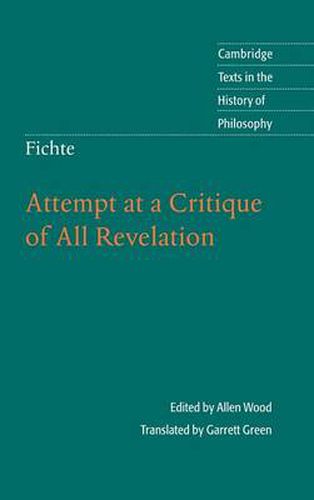Readings Newsletter
Become a Readings Member to make your shopping experience even easier.
Sign in or sign up for free!
You’re not far away from qualifying for FREE standard shipping within Australia
You’ve qualified for FREE standard shipping within Australia
The cart is loading…






The Attempt at a Critique of All Revelation (1792) was the first published work of Johann Gottlieb Fichte (1762-1814), the founder of the German idealist movement in philosophy. It predated the system of philosophy which Fichte developed during his years in Jena, and for that reason - and possibly also because of its religious orientation - later commentators have tended to overlook the work in their treatments of Fichte’s philosophy. It is, however, already representative of the most interesting aspects of Fichte’s thought. It displays an affinity with his later moral psychology, introduces (in theological form) Fichte’s distinctively ‘second-person’ conception of moral requirements, and employs the ‘synthetic method’ which is crucial to the transcendental systems Fichte developed during his Jena period. This volume offers a clear and accessible translation of the work by Garrett Green, while an introduction by Allen Wood sets the work in its historical and philosophical contexts.
$9.00 standard shipping within Australia
FREE standard shipping within Australia for orders over $100.00
Express & International shipping calculated at checkout
The Attempt at a Critique of All Revelation (1792) was the first published work of Johann Gottlieb Fichte (1762-1814), the founder of the German idealist movement in philosophy. It predated the system of philosophy which Fichte developed during his years in Jena, and for that reason - and possibly also because of its religious orientation - later commentators have tended to overlook the work in their treatments of Fichte’s philosophy. It is, however, already representative of the most interesting aspects of Fichte’s thought. It displays an affinity with his later moral psychology, introduces (in theological form) Fichte’s distinctively ‘second-person’ conception of moral requirements, and employs the ‘synthetic method’ which is crucial to the transcendental systems Fichte developed during his Jena period. This volume offers a clear and accessible translation of the work by Garrett Green, while an introduction by Allen Wood sets the work in its historical and philosophical contexts.